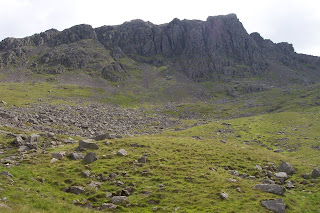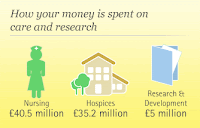With a 0530 start from Lisa’s parents, we set off for Wasdale Head at the foot of Scafell Pike, the highest peak in England. After a long drive parallel to the beautiful Wasdale Lake (Lisa still half asleep – “it’s like the set of Postman Pat” ...(?????).
After the mandatory pre event cup of tea at the camp site café we set off to find the rest of the group. After wandering around the car park looking lost, we stumbled across four of the group doing the same.
We decided we were in the wrong car park and that we should be adventurous and explore the “second” car park – no sign of anyone else. Hmmm.
We stopped a man in a van and found out there was another car park about a mile away and set off to see if we could find where we were supposed to be. However Lisa was slightly distracted by a male Three Peaks team changing in the second car park and was quite happy to stay where she was.
After crossing a river on stepping stones (in Total Wipeout style) and walking across a dry river bed, on the horizon there was a group of trekkers hovering impatiently – that must be them then! In keeping with all our fundraising and training activities so far…we arrived late to the event.
Once we had established everyone was present and correct, the 16 strong team set off for the summit. The weather couldn’t be better and everyone enjoyed the climb. Everyone was fantastic and we can’t wait to take on the big adventure together, all the while raising money for a fantastic cause.
Everyone made it to the summit in good spirits. After a quick break for lunch and time for some team photos (some of which I’m sure will be featured on the cover of “Men’s Health”) and shots of the amazing view we started our decent … back to the pub of course. Back at the foot of the mountain we had another tour of the three car parks (unfortunately the calibre of naked men had dropped somewhat).
Everyone had a great day, especially the six of us whose specialised subject is now the car parks of Wasdale Head.
Everyone had a great day, especially the six of us whose specialised subject is now the car parks of Wasdale Head.
 |
| At the Summit |




















